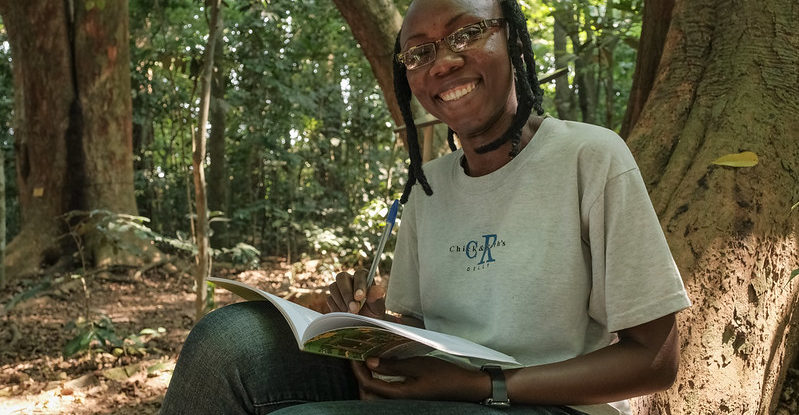
Today’s foresters are faced with solving some of the greatest sustainable development challenges of our time. From combating climate change to preventing future pandemics of zoonotic origin, the world’s forests and the people that manage them are on the front lines.
As the current forestry workforce ages, we need to ensure there will be fresh generations of young people who are excited to enter careers in forestry and address these and future challenges.
But not enough young people are lining up to pursue forest-related careers in many parts of the world
This week, a major survey by the Global Forest Education Project – led by Center for International Forestry Research and World Agroforestry partners, including the U.N. Food and Agriculture Organization (FAO), the International Union of Forest Research Organizations and the International Tropical Timber Organization – has revealed some of the obstacles we face in the race to attract and educate a new generation of people working in forestry.
The first of its kind, the survey gathered information across six regions of the world on where, how, and how well forest education is being taught, from primary and secondary schools to technical and vocational programs and universities.
The survey revealed that in most regions of the world – particularly in the Global South – primary and secondary schools are simply not effectively educating students about forests and trees or motivating them to later pursue forest-related studies and careers. Forest-related knowledge is often inadequately covered in school curricula, including science, technology, engineering and mathematics (STEM) subjects, but also in the social sciences and humanities. Too often, school kids have almost no contact with forests, even when they live next to them.
It is hardly surprising, then, that many young people lack a basic awareness of the benefits of forests and the importance of managing them sustainably.
The survey also revealed that in many places young people tend to view forestry as a low-status and undesirable career. As others have noted, the forest sector continues to have an image problem. For many, forestry is about logging. It can be difficult to understand that sustainable forest management is at the forefront of preventing deforestation and degradation, and is key to helping achieve many of the U.N. Sustainable Development Goals, including those on hunger, poverty, decent work, energy, health and the climate.
In addition, the survey uncovered failings at university and vocational training levels, affecting students who have chosen forestry as a career, including out-dated curricula, a lack of access to digital tools, and insufficient practical skill development and hands-on experience in forests in many regions. Furthermore, the survey noted inadequate respectful inclusion of traditional and indigenous forest-related knowledge in forest education at all levels.
Clearly, forest education needs a shake-up.
To start the process, the International Conference of Forest Education is this week bringing together over 1,000 forest education experts to explore solutions to deliver quality forest education.
This much is already obvious: we must better integrate forest education into curricula from primary levels on up, planting the seed early in the hope of attracting some of the best and brightest to choose forest careers. To protect forests, we must educate young people on how forests work and their value in combating climate change, keeping the planet healthy, and supporting sustainable human industry.
We can start in primary school by inspiring young children with field trips to forests or even simply studying schoolyard ecology to teach them how trees and forests work. Supported by Germany, FAO is currently running a pilot project to bring targeted forest education to schoolchildren aged 9-12, starting with a three-year cycle of innovative, interactive lessons in Tanzania and the Philippines. Working with the German nature conservation association Schutzgemeinschaft Deutscher Wald (SDW) and national education experts, FAO is developing locally relevant lesson modules for teachers and pupils based on the German Waldpädagogik (forest pedagogical) approach to forest education, which prioritizes hands-on learning experiences to promote understanding of sustainable forest use.
For older students, we need to ensure that forest knowledge is well incorporated across the natural and social sciences – and into other parts of the curricula, including the humanities. In this way, students should be exposed to different cultural perspectives, including indigenous knowledge, that build their understanding of forests and forestry. Redressing the image of forestry as a typically male profession is vitally important.
Young people – from forest communities to urban areas – also need to be made aware of the huge range of sustainable forestry careers available, from policymakers, app developers and entrepreneurs to satellite imagery analysts, drone pilots and entomologists.
We can and must ensure all children and young people have knowledge and awareness of forests and their importance to our planet and livelihoods. In doing so, we may inspire some of them to become the forest leaders of tomorrow.
We want you to share Forests News content, which is licensed under Creative Commons Attribution-NonCommercial-ShareAlike 4.0 International (CC BY-NC-SA 4.0). This means you are free to redistribute our material for non-commercial purposes. All we ask is that you give Forests News appropriate credit and link to the original Forests News content, indicate if changes were made, and distribute your contributions under the same Creative Commons license. You must notify Forests News if you repost, reprint or reuse our materials by contacting forestsnews@cifor-icraf.org.